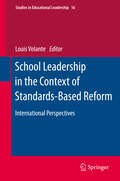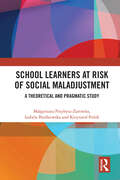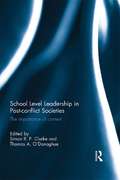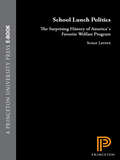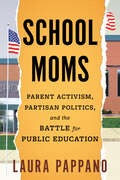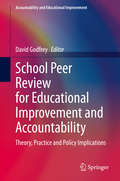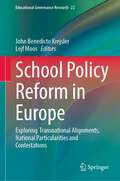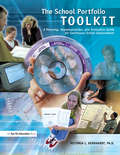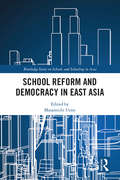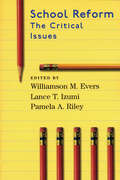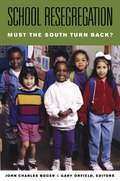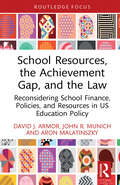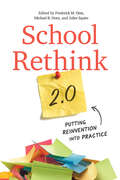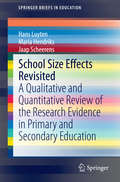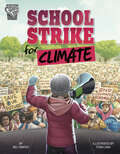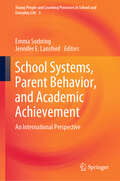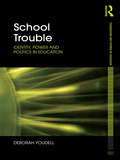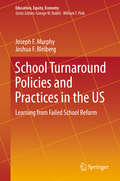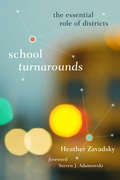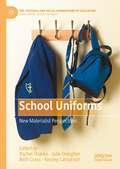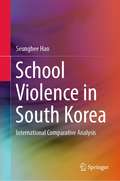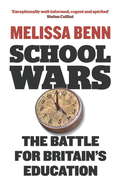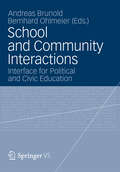- Table View
- List View
School Leadership in the Context of Standards-Based Reform
by Louis Volante"Although standards-based reform emerged in the United States and the United Kingdom, the idea has spread across the world, as an approach to systemic reform. It might appear that there is a world-wide "tsunami" of standards-based reform that will standardize and homogenize the educational system across the globe. This volume makes it very clear, however, that there is no one approach to standards-based reform and countries change - there is a danger in paying attention to its evolution and impact in only one context. That's what makes this volume so valuable. Louis Volante has drawn together descriptions from a wide range of countries, all involved in large-scale reform and using standards and assessments as part of their process. What becomes very obvious is that the language may be the same but the words reflect different contexts and can represent very different ideals, values, and processes. I'm sure you will find this book as interesting and challenging as I have - a gem that pushes your thinking and does not allow readers to remain neutral." (Lorna Earl)
School Learners at Risk of Social Maladjustment: A Theoretical and Pragmatic Study
by Małgorzata Przybysz-Zaremba Izabela Bieńkowska Krzysztof PolokThis book is a valuable didactic help (school teachers, guardians, and parents included) for those who wish to understand the specifics of education better and for students of pedagogical and psychological faculties who plan to work with young people in various educational institutions.This volume examines the problems and challenges of social maladjustment at school from a theoretical and practical perspective – it not only aims to present the latest scientific research on students at risk of social maladjustment (as well as those socially maladjusted) but also proposes strategies and methods of working with those a-ected by it. In nine chapters focusing on various aspects of social maladjustment in school, the authors use their professional and scientific experience to present practical tips and suggestions for teachers, therapists, and pedagogues suggesting preventive actions to counteract pathological phenomena in schools.This book will be useful for all those professionally involved in the fields of education, psychology, sociology, remote work, and/or studies on child and youth development. It could also be an invaluable companion to policy-makers and professionals from government and nongovernment organizations working towards inclusive education and social development. Additionally, it will serve as a compendium of guiding methods for problems encountered in professional work.
School Level Leadership in Post-conflict Societies: The importance of context
by Simon R. P. Clarke and Thomas A. O’DonoghueHow do different contexts influence the nature and character of school leadership? This book is predicated on the simple, yet profound, observation that school leadership can only be understood within the context in which it is exercised. The observation is particularly valid in relation to post-conflict societies especially when they have eventuated from new-wars. Schools in these contexts face highly complex circumstances and a level of environmental turbulence requiring different kinds of leadership from those operating in less complicated and relatively stable situations. By assembling an impressive array of international experts, this book investigates a much neglected area of research. Each chapter highlights the importance of context for understanding the realities of school leadership, and reveals the challenges and influences that school leaders face as well as the strategies they adopt to deal with the complexities of their work. In particular, valuable insights are provided into how intractable problems faced by schools can affect student, professional and organizational learning agendas. There are also important glimpses of the progression that can be made in schools by: -Enhancing the curriculum -Energizing teaching capacity; and -Optimising leadership capacity. Depictions of post-new war environments include Angola, Ghana, Sri Lanka, Rwanda, Kenya, Solomon Islands, Lebanon, Kosovo, Timor-Leste and Northern Ireland. The book will be key reading for undergraduate and postgraduate students studying educational leadership, comparative education and education policy.
School Lunch Politics: The Surprising History of America's Favorite Welfare Program
by Susan LevineWhether kids love or hate the food served there, the American school lunchroom is the stage for one of the most popular yet flawed social welfare programs in our nation's history. School Lunch Politics covers this complex and fascinating part of American culture, from its origins in early twentieth-century nutrition science, through the establishment of the National School Lunch Program in 1946, to the transformation of school meals into a poverty program during the 1970s and 1980s. Susan Levine investigates the politics and culture of food; most specifically, who decides what American children should be eating, what policies develop from those decisions, and how these policies might be better implemented. Even now, the school lunch program remains problematic, a juggling act between modern beliefs about food, nutrition science, and public welfare. Levine points to the program menus' dependence on agricultural surplus commodities more than on children's nutritional needs, and she discusses the political policy barriers that have limited the number of children receiving meals and which children were served. But she also shows why the school lunch program has outlasted almost every other twentieth-century federal welfare initiative. In the midst of privatization, federal budget cuts, and suspect nutritional guidelines where even ketchup might be categorized as a vegetable, the program remains popular and feeds children who would otherwise go hungry. As politicians and the media talk about a national obesity epidemic, School Lunch Politics is a timely arrival to the food policy debates shaping American health, welfare, and equality.
School Moms: Parent Activism, Partisan Politics, and the Battle for Public Education
by Laura PappanoAn on-the-ground look at the rise of parent activism in response to the far-right attacks on public school educationFor well over a century, public schools have been a non-partisan gathering place and vital center of civic life in America--but something has changed. In School Moms, journalist Laura Pappano explores the on-the-ground story of how public schools across the country have become ground zero in a cultural and political war as the far-right have made efforts to seek power over school boards.Pappano argues that the rise of parent activism is actually the culmination of efforts that began in the 1990s after campaigns to stop sex education largely fizzled. Recent efforts to make public schools more responsive and inclusive, as well as the pandemic, have offered openings the far-right have been waiting for to organize and sway parents, who are frustrated and exhausted by remote learning, objections by teacher&’s unions, and shifting directives from school leaders. Groups like Moms for Liberty and Parents Defending Education are organizing against revised history curricula they have dubbed as "CRT," banning books, pressing for "Don't Say Gay" laws, and asserting "parental rights" to gain control over the review of classroom materials. On the other side, progressive groups like Support Our Schools and Red, Wine & Blue are mobilizing parents to counter such moves.Combining on-the-ground reporting with research and expert interviews, School Moms will take a hard look at where these battles are happening, what is at stake, and why it matters for the future of our schools.
School Peer Review for Educational Improvement and Accountability: Theory, Practice and Policy Implications (Accountability and Educational Improvement)
by David GodfreyThis book explores how peer reviews are used in school improvement, accountability and education system reform. Importantly, these issues are studied through numerous international cases and new empirical evidence. This volume also identifies and describes barriers and facilitators to the development, use, sustainability and expansion of school peer review. School peer reviews are a form of internal evaluation driven by schools themselves rather than externally imposed, such as with school inspections. Schools collaborate with other schools in networks, collect data through self-evaluation and in school review visits. They provide feedback, challenge and support to each other. Despite the increased use of school peer review in system reform and school improvement, very little research has been conducted on this model and there is a dearth of literature that looks at the phenomenon internationally. This book fills this gap and will be an invaluable source for academics in school leadership and educational evaluation and accountability, as well as those working at the level of executive leadership in school networks, NGOs and in government policy-making.
School Policy Reform in Europe: Exploring Transnational Alignments, National Particularities and Contestations (Educational Governance Research #22)
by Lejf Moos John Benedicto KrejslerThis book discusses national school policy reforms in a number of key European countries and shows how these are framed in transnational collaborations that meet with national particularities and contestations. It gives an overview of school policy developments that represents the diversity of Europe within a comparative framework.It takes point of departure in the fact that European countries in their school and education policies have been increasingly aligning with each other, mostly via transnational collaborations, the OECD, EU, and the Bologna Process. Even the IEA has been instrumental to motivate alignments by means of influential surveys, knowledge production and methodological development. This alignment in terms of common standards, social technologies, qualification frameworks and so forth have aimed at facilitating mobility of students, workers, business and so forth as well as fostering a European identity among citizens from Europe’s patchwork of small and medium-size countries, representing a patchwork of different languages, cultures and societal contexts. In national recontextualizations, however, alignments have been continuously contested according to the particularities of what has been possible educationally and politically in the different national contexts. Furthermore, the return of national(isms) as well as the rise of edubusiness and digitalization have been increasingly influential. This book thus concludes that increasing transnational alignments have to be observed with meticulous attention to different national contexts that matter greatly.
School Portfolio Toolkit: A Planning, Implementation, and Evaluation Guide for Continuous School Improvement
by Victoria BernhardtThe School Portfolio Toolkit is a book that includes over 300 tools, strategies, templates, and examples for use in building school portfolios and for planning, implementing, and evaluating continuous school improvement. The Toolkit was written to support school personnel with the mechanics of putting together a school portfolio, as well as to offer processes and strategies to move whole school staffs into and through continuous improvement. The tools in the Toolkit will help staffs create, implement, and maintain school portfolios and begin the journey of continuous improvement. Each chapter deals with one topic related to the school portfolio and comprehensive school improvement, with related documents and tools. The School Portfolio Toolkit book provides templates, tools, examples, and strategies that will help you analyze your school's data, create a vision that is truly shared by the school staff, build a continuous school improvement plan to implement the school vision, formulate a leadership structure to implement the vision, involve parents, community, and business in implementing the vision, embed up to forty different powerful professional development designs into your school plan, evaluate your continuous school improvement work, and create a School Portfolio that will organize and serve as a framework for the continuation of this work
School Reform and Democracy in East Asia (Routledge Series on Schools and Schooling in Asia)
by Masamichi UenoThis book discusses how East Asia has introduced school and curricular reform to reflect democratic citizenship and globalized skills, knowledge, dispositions, and competencies in the 21st century. It also focuses on the tendencies and reasons students from Japan, China, South Korea, Taiwan, and Singapore receive the highest scores in international students’ assessment such as PISA and TIMSS; yet their curiosity and motivation for learning are the lowest internationally. Moreover, Indonesian and Vietnamese students are likely to receive the lowest testing scores, yet their motivation for learning is quite high. It is worth investigating high academic achievement in East Asia in light of the trend towards democratization. The authors consider controversial issues such as whether the goals of democratic education should be the attainment of high academic scores, consideration of whether to implement competency-based curriculums or meritocratic systems of academic competition, and the provision of equal opportunities in the community of learning. The book illuminates each country’s struggle to realise school reform on the basis of its social and cultural settings, and looks at what connects East Asia’s past, present, and future.
School Reform: The Critical Issues
by Lance T. Izumi Williamson M. EversThis book explores a wide range of critical areas in education, examines the basic nature of our education problems, provides a clear understanding of underperformance, and proposes reasonable and effective strategies for success.
School Resegregation
by Gary Orfield John Charles BogerConfronting a reality that many policy makers would prefer to ignore, contributors to this volume offer the latest information on the trend toward the racial and socioeconomic resegregation of southern schools. In the region that has achieved more widespread public school integration than any other since 1970, resegregation, combined with resource inequities and the current "accountability movement," is now bringing public education in the South to a critical crossroads. In thirteen essays, leading thinkers in the field of race and public education present not only the latest data and statistics on the trend toward resegregation but also legal and policy analysis of why these trends are accelerating, how they are harmful, and what can be done to counter them. What's at stake is the quality of education available to both white and nonwhite students, they argue. This volume will help educators, policy makers, and concerned citizens begin a much-needed dialogue about how America can best educate its increasingly multiethnic student population in the twenty-first century.Contributors:Karen E. Banks, Wake County Public School System, Raleigh, N.C.John Charles Boger, University of North Carolina School of LawErwin Chemerinsky, Duke Law SchoolCharles T. Clotfelter, Duke UniversitySusan Leigh Flinspach, University of California, Santa CruzErica Frankenberg, Harvard Graduate School of EducationCatherine E. Freeman, U.S. Department of EducationJay P. Heubert, Teachers College, Columbia UniversityJennifer Jellison Holme, University of California, Los AngelesMichal Kurlaender, Harvard Graduate School of EducationHelen F. Ladd, Duke UniversityLuis M. Laosa, Kingston, N.J.Jacinta S. Ma, U.S. Equal Employment Opportunity CommissionRoslyn Arlin Mickelson, University of North Carolina at CharlotteGary Orfield, Harvard Graduate School of EducationGregory J. Palardy, University of Georgiajohn a. powell, Ohio State UniversitySean F. Reardon, Stanford UniversityRussell W. Rumberger, University of California, Santa BarbaraBenjamin Scafidi, Georgia State UniversityDavid L. Sjoquist, Georgia State UniversityJacob L. Vigdor, Duke UniversityAmy Stuart Wells, Teachers College, Columbia UniversityJohn T. Yun, University of California, Santa Barbara
School Resources, the Achievement Gap, and the Law: Reconsidering School Finance, Policies, and Resources in US Education Policy (Routledge Research in Education Policy and Politics)
by David J. Armor John R. Munich Aron MalatinszkyThis book offers a novel and up-to-date exploration of the common belief that increasing conventional school resources will increase academic achievement and help close gaps between various advantaged and disadvantaged students. Taking the scholarship around this question, such as James S. Coleman’s 1965 report on the Equality of Educational Opportunity, as a starting point, it brings in an extensive range of contemporary data sources and statistical analysis to offer an updated, robust, and considered review of the issue. Moving beyond these empirical questions, it also explores how these empirical findings have been utilized in “education adequacy” litigation, discussing the evolving law of adequacy cases, while explaining the challenges of introducing complex data and analyses within a litigation framework. Judges typically have little experience with the complexity of modern education data and the analyses required to draw sound inferences. It will thus be of interest to scholars, researchers, and faculty with expertise in education policy, the economics and sociology of education, and public policy.
School Resources, the Achievement Gap, and the Law: Reconsidering School Finance, Policies, and Resources in US Education Policy (Routledge Research in Education Policy and Politics)
by David J. Armor John R. Munich Aron MalatinszkyThis book offers a novel and up-to-date exploration of the common belief that increasing conventional school resources will increase academic achievement and help close gaps between various advantaged and disadvantaged students. Taking the scholarship around this question, such as James S. Coleman’s 1965 report on the Equality of Educational Opportunity, as a starting point, it brings in an extensive range of contemporary data sources and statistical analysis to offer an updated, robust, and considered review of the issue. Moving beyond these empirical questions, it also explores how these empirical findings have been utilized in “education adequacy” litigation, discussing the evolving law of adequacy cases, while explaining the challenges of introducing complex data and analyses within a litigation framework. Judges typically have little experience with the complexity of modern education data and the analyses required to draw sound inferences. It will thus be of interest to scholars, researchers, and faculty and jurists with expertise or interest in education policy, the economics and sociology of education, and public policy.
School Rethink 2.0: Putting Reinvention into Practice
by Frederick M. Hess Michael B. Horn Juliet SquireTen brilliant approaches that are disrupting US education and actionable advice for their broader implementation
School Size Effects Revisited
by Jaap Scheerens Hans Luyten Maria HendriksThis book provides a thorough review of the research literature on the effect of school size in primary and secondary education on three types of outcomes: student achievement, non-cognitive outcomes and costs per student. Based on 84 scientific publications and several prior reviews, the book discusses four main areas: the impact of school size on cognitive learning outcomes and non-cognitive outcomes; the "state of the art" of empirical research on economies of size; the direct and indirect impact of school size, conditioned by other school context variables on student performance and the specific position of the Netherlands in an international perspective. The book presents summaries of the results and main conclusions found and discusses these with respect to their relevance for educational policy in general and for the Netherlands in particular. The book concludes with suggestions for future research on school size.
School Strike for Climate (Movements and Resistance)
by Nel YomtovIn August 2018, a teenager named Greta Thunberg missed school to sit outside the Swedish parliament with a sign that read School Strike for Climate. She was demanding that government leaders take stronger action against climate change due to global warming. At first, Greta sat alone. But her message spread. Other students joined her in the movement that became known as Fridays for Future. By September 2019, millions of activists from around the world marched in protests to protect the future of the planet.
School Systems, Parent Behavior, and Academic Achievement: An International Perspective (Young People and Learning Processes in School and Everyday Life #3)
by Emma Sorbring Jennifer E. LansfordThis volume takes an international and multidisciplinary approach to understanding students’ academic achievement. It does so by integrating educational literature with developmental psychology and family studies perspectives. Each of the nine chapters focuses on a particular country: China, Colombia, Italy, Jordan, Kenya, the Philippines, Sweden, Thailand, or the United States. It describes the country as a cultural context, examines the current school system and parenting in light of the school system, and provides empirical evidence from that country regarding links between parenting and students’ academic achievement. The book highlights similarities and differences in education and parenting across these nine countries - all varying widely in socioeconomic and cultural factors that affect schools and families. The volume contributes to greater understanding of links between parenting and academic performance in different cultural groups. It sheds light on how school systems and parenting are embedded in larger cultural settings that have implications for students’ educational experiences and academic achievement. As two of the most important contexts in which children and adolescents spend time, understanding how schools and families jointly contribute to academic achievement holds promise for advancing the international agenda of promoting quality education for all.
School Trouble: Identity, Power and Politics in Education (Foundations and Futures of Education)
by Deborah YoudellWhat is the trouble with schools and why should we want to make ‘school trouble’? Schooling is implicated in the making of educational and social exclusions and inequalities as well as the making of particular sorts of students and teachers. For this reason schools are important sites of counter- or radical- politics. In this book, Deborah Youdell brings together theories of counter-politics and radical traditions in education to make sense of the politics of daily life inside schools and explores a range of resources for thinking about and enacting political practices that make ‘school trouble’. The book offers a solid introduction to the much-debated issues of ‘intersectionality’ and the limits of identity politics and the relationship between schooling and the wider policy and political context. It pieces together a series of tools and tactics that might destabilize educational inequalities by unsettling the knowledges, meanings, practices, subjectivities and feelings that are normalized and privileged in the ‘business as usual’ of school life. Engaging with curriculum materials, teachers’ lesson plans and accounts of their pedagogy, and ethnographic observations of school practices, the book investigates a range of empirical examples of critical action in school, from overt political action pursued by educators to day-to-day pedagogic encounters between teachers and students. The book draws on the work of Michel Foucault, Judith Butler, Ernesto Laclau and Chantel Mouffe, and Gilles Deleuze and Felix Guattari to make sense of these practices and identify the political possibilities for educators who refuse to accept the everyday injustices and wide-reaching social inequalities that face us. School Trouble appears at a moment of political and economic flux and uncertainty, and when the policy moves that have promoted markets and private sector involvement in education around the globe have been subject to intense scrutiny and critique. Against this backdrop, renewed attention is being paid to the questions of how politics might be rejuvenated, how societies might be made fair, and what role education might have in pursing this. This book makes an important intervention into this terrain. By exploring a politics of discourse, an anti-identity politics, a politics of feeling, and a politics of becoming, it shows how the education assemblage can be unsettled and education can be re-imagined. The book will be of interest to advanced undergraduate and postgraduate students and scholars in the fields of education, sociology, cultural studies, and social and political science as well as to critical educators looking for new tools for thinking about their practice.
School Turnaround Policies and Practices in the US: Learning From Failed School Reform (Education, Equity, Economy Ser. #6)
by Joseph F. Murphy Joshua F. BleibergThis volume provides an analysis of what we know about turning around "failing" schools in the United States. It starts with an in-depth examination of the barriers that hinder action on turnaround work.The book analyses the reasons why some schools that find themselves in serious academic trouble fail in their efforts to turn themselves around. Beginning with a discussion of what may best be described as "lethal" reasons or the most powerful explanation for failed reform initiatives, which include an absence of attention to student care and support; a near absence of attention to curriculum and instruction; the firing of the wrong people. Covered in this volume are "critical" explanations for failed turnaround efforts such as failure to attend to issues of sustainability, and "significant" explanations for failed turnaround efforts such as the misuse of test data. The volume concludes by examining what can be done to overcome problems that cause failure for turnaround schools and reviewing ideas in the core technology of schooling: curriculum, instruction, and assessment. As well as exploring problems associated with the leadership and management of schools to see where improvement is possible and an analysis of opportunities found in relationships between schools and their external partners such as parents and community members.
School Turnarounds: The Essential Role of Districts
by Heather Zavadsky Steven J. AdamowskiThe inspiration for this book was a crucial observation: that if the school turnaround movement is to have widespread and lasting consequences, it will need to incorporate meaningful district involvement in its efforts. The result is a volume that considers school turnaround efforts at the district level, examining the evidence thus far and indicating fruitful directions for district-based initiatives going forward. At the heart of the book are case studies of districts--in Philadelphia, Charlotte-Mecklenburg, Denver, Sacramento, and Long Beach--that have developed systemwide policies and programs for instituting turnaround reforms in their member schools. These cases--and the book as a whole--bring district-based initiatives and options into the larger discussion of the turnaround movement and its potential for improving chronically low-performing schools.
School Turnarounds: The Essential Role of Districts (Educational Innovations Series)
by Heather ZavadskyThe inspiration for this book was a crucial observation: that if the school turnaround movement is to have widespread and lasting consequences, it will need to incorporate meaningful district involvement in its efforts. The result is a volume that considers school turnaround efforts at the district level, examining the evidence thus far and indicating fruitful directions for district-based initiatives going forward. At the heart of the book are case studies of districts—in Philadelphia, Charlotte-Mecklenburg, Denver, Sacramento, and Long Beach—that have developed systemwide policies and programs for instituting turnaround reforms in their member schools. These cases—and the book as a whole—bring district-based initiatives and options into the larger discussion of the turnaround movement and its potential for improving chronically low-performing schools.
School Uniforms: New Materialist Perspectives (The Cultural and Social Foundations of Education)
by Rachel Shanks Julie Ovington Beth Cross Ainsley CarnarvonThis edited volume brings together a new materialist approach to understanding the various legacies and controls being exercised through school uniforms. Through examining school uniform policies, the editors and their authors highlight the embodied choices that contribute to a socio-materialist understanding of democracy and social justice. Uniform policy plays a distinct role in setting the culture of compulsory school education and as such it constitutes a set of under-theorised school practices. This work thus brings together critical perspectives from education, sociology, cultural and postcolonial studies within an overarching analysis of how uniform imposes performances that have a formative effect on young people’s identities and economic positionality.
School Violence in South Korea: International Comparative Analysis
by Seunghee HanThis book examines school violence in South Korea from an international comparative perspective. It analyses nationally representative samples and provides extensive literature reviews based on academic journals, various social and educational magazines and major media articles on school violence in South Korea. This book includes major data sets for the analysis such as Trends in International Mathematics and Science Study and Nation Youth Policy Institute. These data show frequency, patterns and associated factors of school violence in South Korea and comparison of those in Japan and the United States.
School Wars
by Melissa BennSchool Wars tells the story of the struggle for Britain's education system. Established during the 1960s and based on the progressive ideal of good schools for all, the comprehensive system has over the past decades come under sustained attack from successive governments.Now, with the growing inequalities of our current system, the damaging impact of spending cuts, the rise of "free schools" and the growth of the private sector in education, the values embodied in the comprehensive ideal are under threat. The situation is expertly anatomized by journalist and educational campaigner Melissa Benn, who explores the dangerous example of US education reform, where privatization, punitive accountability and the rise of charter schools have intensified social, economic and ethnic divisions.The policies of successive British governments have been muddled and confused, but one thing is clear: that the relentless application of market principles signals a fundamental shift from the ideal of quality education as a public good, to education as market-controlled commodity. Benn ends by outlining some key principles for restoring strong educational values within a fair, non-selective public education system.
School and Community Interactions
by Andreas Brunold Bernhard OhlmeierWithin the European and Asian context scientists from nine different countries are concerned with political and social interactional structures between schools as public institutions and the local political actors which influence the school environment. The contributions give answers to questions regarding the cooperation between school administrations and community, to civic education for sustainable development at the interface between school and community, to teachers as moderators for political and democratic educational processes and to models for successful cooperation between schools and local political actors.
